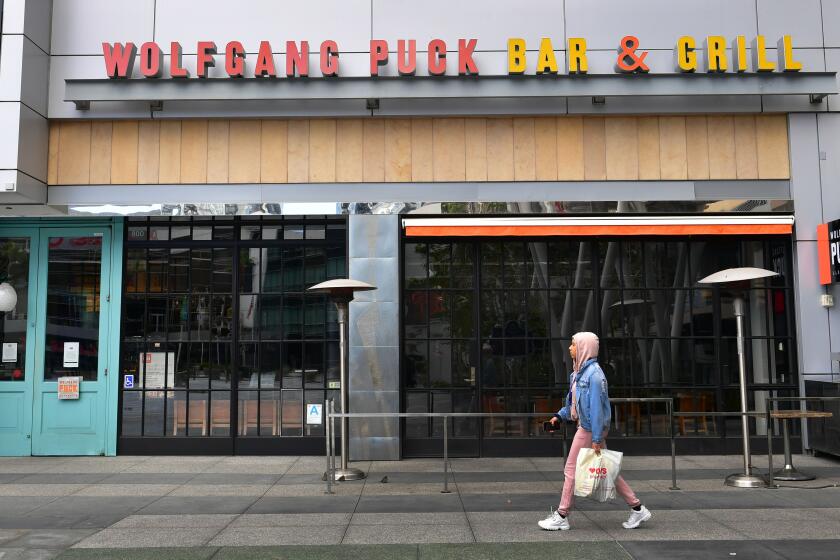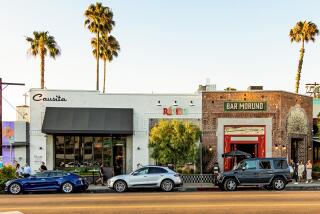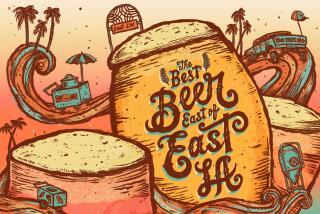Struggling amid the shutdown, L.A. craft breweries reinvent to survive
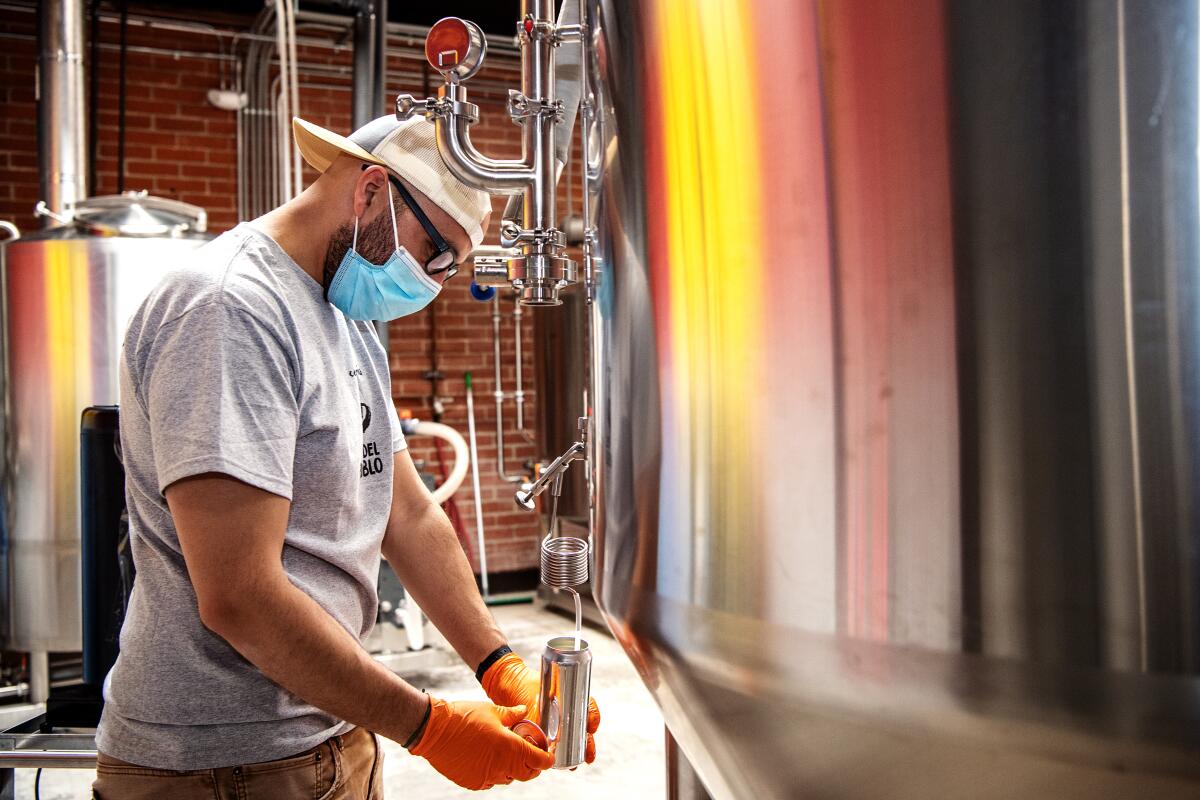
- Share via
Martin Quinones has spent the last three years building Cervecería Del Pueblo, a small production brewery and taproom in Pasadena.
As the coronavirus pandemic forced the closure of nonessential businesses across the state, Quinones realized that his long-awaited grand opening would have to wait a little longer.
“I was literally ready to open the doors, then this happened,” said Quinones, a motion picture sound editor turned brewer. “It’s painful, for sure.”
Over the last decade or so, the Los Angeles area has been fertile ground for independent breweries, home to a thriving craft beer scene that has seen names such as Eagle Rock Brewery and Beachwood Brewing grow from small, upstart operations into regional powerhouses.
The L.A. Brewers Guild, a nonprofit trade group for independent brewers producing the majority of their beer within county lines, has 95 members, making it one of the largest regional guilds in the state.
Even before the coronavirus pandemic hit, many in the industry were expressing concern over what they saw as a looming economic bubble: too many breweries opening too quickly, for too long.
Gov. Gavin Newsom laid out new guidelines for restaurants once the state’s stay-at-home orders are lifted.
Last month, as taprooms, bars and restaurants were ordered to close, craft beer faced a harsh new reality. On-site sales and draft beer distribution, which make up the majority of revenue for many breweries, suddenly evaporated.
“We had beer in tanks going to bars and restaurants. We had beer that was brewed for Disneyland and Coachella. All those orders were canceled overnight,” said Laurie Porter, who owns and operates Smog City Brewing in Torrance with her husband, John.
The closure of brewery taprooms delivered another blow. Porter said most of Smog City’s beer is sold at three retail locations, which have seen sales dip by 60% on average even as they stay open to sell beers packaged to-go in cans and crowlers (large-format cans).
A recent survey released by the Brewers Assn., a national trade group, paints a bleak picture for the industry. According to the survey, 46% of craft breweries nationwide might be forced to permanently close within three months due to the effects of the coronavirus pandemic.
“This is by far the most challenging time for our industry in the last decade.”
— Frances Lopez, executive director of the L.A. Brewers Guild
And a survey released Tuesday by the California Craft Brewing Assn. found that since stay-at-home orders had gone into effect, breweries across the state had suffered a 43% decline in sales on average, laid off 29% of their workforce and furloughed an additional 31%.
Frances Lopez, executive director of the L.A. Brewers Guild, said that although the survey’s results were alarming, she was hopeful that L.A.’s tight-knit brewing community would be able to share resources and knowledge to weather the storm.
“This is by far the most challenging time for our industry in the last decade,” she said. “We are definitely bracing ourselves for a rough ride, but we’re holding onto the optimism that, unlike the recession, business can jump back to a reasonable place once our normal operations are no longer on pause.”
Lopez also noted that, unlike in states such as Nevada and New Jersey, California breweries were deemed essential businesses, allowing them to continue brewing and selling beer to keep the lights on.
“A complete halt to all business activity would have immediately crippled our industry,” she said.
In the meantime, local breweries quickly pivoted to selling beer to-go and via delivery, expanding canning operations and in some cases launching statewide shipping programs.
At Three Weavers Brewing in Inglewood, customers now can place orders online and arrange for contactless pickup or delivery within the hour. Other breweries, such as MacLeod Ale Brewing in Van Nuys, have leaned on pizza delivery and takeout to offset a drop in taproom sales.
Brent Knapp, cofounder of the 2-year-old Common Space Brewery, said the Hawthorne company launched a next-day beer delivery service less than 24 hours after its taproom closed.
“We’re selling dramatically less beer overall, but our can sales are up probably four or five times,” Knapp said. “Delivery has helped a lot with just being able to support our employees.”
As a way to keep customers engaged, Knapp has begun pushing up special beer releases that he usually would have spread throughout the year, including Oh Yeah!, a fruit punch-flavored milkshake IPA that Knapp said has sold better than any beer Common Space has ever released.
Still, overall revenue is down at least 60%, Knapp said, which has forced the brewery to cut the hours of most staff and furlough others.
“We came into this year as busy as we’ve ever been, but this just hit us like a wave,” he said. “We’ve had to slash payroll dramatically, we’re talking with vendors and credit card companies about deferral and forgiveness, talking with our landlord. It’s tough, but there’s no chance we survive unless we make those choices.”
In Torrance, Smog City also has furloughed staff. Beer, which is normally brewed six to 10 times per week, is brewed only four to five times, Porter said.
Porter and Knapp said their breweries are more fortunate than others, because they’ve been able to shift production toward cans and crowlers.
“There’s a huge demand for canning materials and mobile canning lines right now, and if you’re not already set up, it’s difficult to get started overnight,” Knapp said.
Though draft beer kegs offer a much higher profit margin than a six-pack, Porter said Smog City’s ability to sell to large retail distributors has been a life preserver.
“If this had happened nine years ago when we first opened, it would have crushed us,” Porter said. “Breweries that don’t have their products in stores are struggling the most.”
As for long-term effects, few brewers know what to expect. Knapp knows his current business model isn’t sustainable for more than a few months but is unsure what the craft beer landscape will look like once stay-at-home orders are eased.
“The biggest question is will people feel comfortable going out to drink like they used to? And all the bars and restaurants we supply, are they going to make it?” he said.
“For me, that warm and welcoming feeling you get from drinking at a brewery is so crucial, I really do hope things return to normal after this.”
As a way to re-create the social atmosphere of the taproom, Porter has launched a Thursday night happy hour via Zoom, inviting Smog City fans to share beers and conversation and discuss new releases, like the brewery’s Strange Times IPA line.
“We had about 30 people join the event in the first week, and it was really the closest thing I’ve felt to that energy you get from a crowded taproom,” she said. “We’re basically trying to be as creative as possible to get through this.”
Other breweries have found ways to serve their community even as they struggle to remain afloat. Ogopogo Brewing in San Gabriel, Angry Horse Brewing in Montebello and Arrow Lodge Brewing in Covina have begun to produce sanitizer for front-line healthcare and emergency workers. Some, like Highland Park Brewery in Chinatown, have acted as hubs for small farmers selling boxes of produce.
“As difficult as this is, there’s this balance of knowing that every brewer here is in the same boat right now,” Porter said.
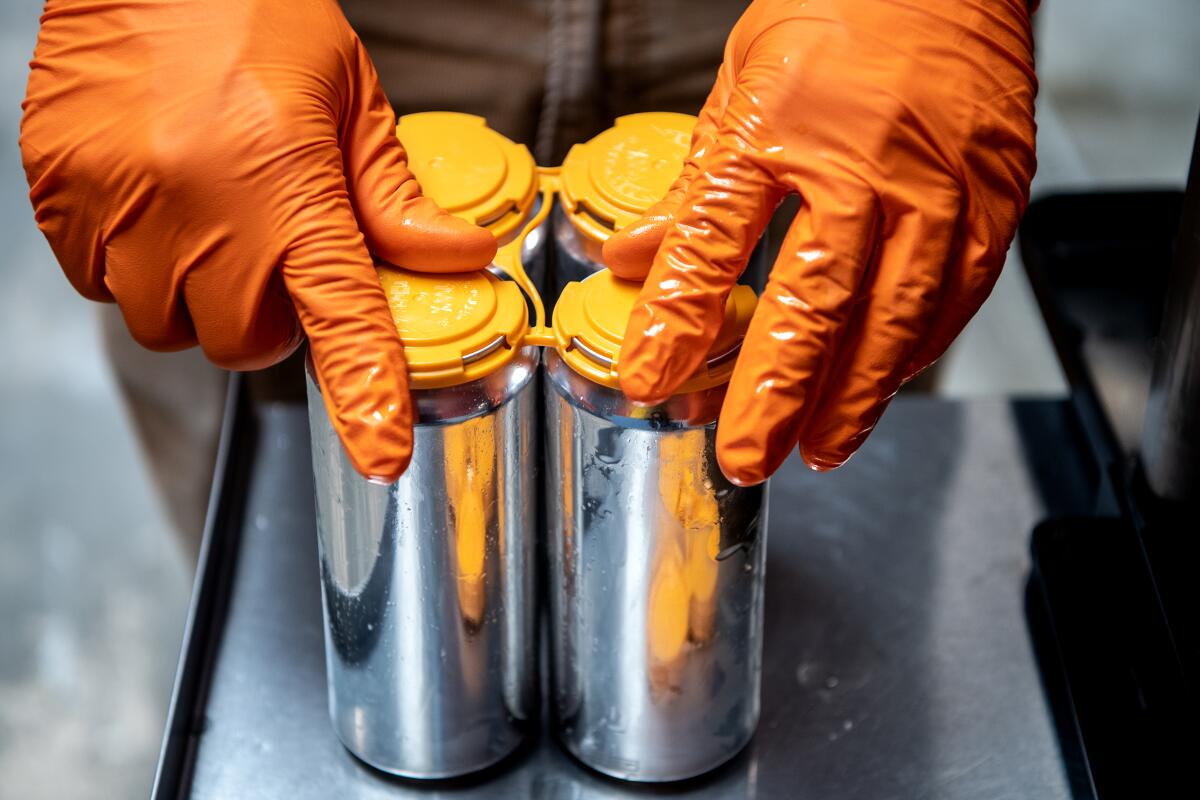
Quinones of Cervecería Del Pueblo hopes there’s a light at the end of the tunnel for his nascent brewing operation too.
He’s spent the last few weeks brewing beer and doing deliveries himself, doing his best to spread the word about his new brewery through promoted Instagram posts.
Quinones, who invested most of his life savings to build the brewery, said that he wasn’t planning on canning his beers early but that he was able to procure a small canning machine to get his beer out.
“Obviously, there is nothing that replaces a taproom for introducing your beers and meeting customers, but right now I’m just trying to get a foothold and sell to the community,” he said. “It’s not easy to run a business with no revenue, but right now it’s just me and I’m trying to adapt.”
In his first two weeks, Quinones said he has sold 1,000 cans — his Pilsener and Kölsch have been most popular — to customers who’ve found his brewery through social media or by driving past the small brick warehouse where it is located.
One of his largest purchases came from Sage Vegan Bistro & Brewery in Echo Park, a fellow Brewers Guild member, which bought 144 cans.
“It meant so much to have that support,” Quinones said. “Even with all the obstacles going on, it gives you a reason to keep pushing.”
More to Read
Eat your way across L.A.
Get our weekly Tasting Notes newsletter for reviews, news and more.
You may occasionally receive promotional content from the Los Angeles Times.
